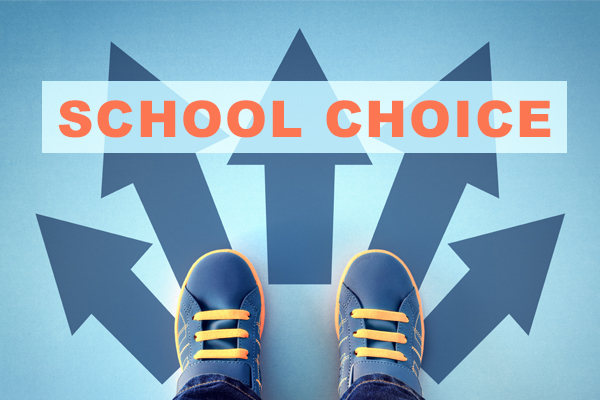Fact Sheet

A Fair, Accountable, and Transparent Education
Just prior to vetoing legislation that could have provided scholarships for up to 50,000 waitlisted students, Governor Wolf called the Educational Improvement Tax Credit (EITC) program a distraction that lacks “fairness and accountability.” He further claimed that “all students should be educated through the public school system.”
Two months later, the governor attacked charter schools, again under the guise of fairness, accountability, and transparency.
But what are the facts on fairness, accountability, and transparency in the Commonwealth’s education system?
Fairness: Every Child Should Have Access to a School that Meets their Needs
Children are being turned away from their school of choice.
- It is easier to gain admission to an Ivy League school like the University of Pennsylvania than many Pennsylvania charter schools. Establishing a new charter schools requires school district approval, but they are frequently denied. Their only recourse is to the state charter appeals board.
- Pennsylvania charter students are disproportionately low-income and minority—in other words, among the most vulnerable—but they receive 27% less funding than district students.
- Tax credit scholarships serve thousands of low-income Pennsylvania students with an average scholarship of just $2,000, yet tens of thousands of Pennsylvania students are waitlisted because of arbitrary caps.
Accountability: All Public Schools Should Be Held to the Same Standard
While underperforming charter schools have closed in Pennsylvania, chronically underperforming district schools that fail their communities are often rewarded with more money.
- Pottsville’s superintendent recently admitted regularly breaking the law by not sending payments to charter schools. Rather than hold derelict districts like this accountable, Governor Wolf wants to charge charters a fee to obtain the unlawfully withheld money.
- An audit of Harrisburg city schools documented $2.6 million in “potential questioned costs,” and an additional $2.5 million in unsupported expenditures” despite years of state oversight. The FBI has now stepped in to investigate.
- In Pittsburgh, Superintendent Anthony Hamlet brought Pittsburgh educators on an unauthorized vacation to Cuba, spent “millions on dozens of contracts without competitive review,” and has been a paid consultant for companies that were awarded district contracts. Meanwhile, Pittsburgh students test far below state averages.
- Scranton School District similarly came under fire for no-bid contracts, lax inventory management of IT equipment, and “gross financial mismanagement.”
- Penn Hills School District suffers from poor academic outcomes and $170 million in debt. Rather than being held accountable, district administration landed a $3 million bailout. Charter schools, on the other hand, risk closure if they’re not living up to standards.
Meanwhile, spending by school districts has increased 24% over the past 10 years even while enrollment has decreased 8%.
Chart: Education Spending v. District Enrollment
True accountability happens when schools are answerable to parents. When parents can walk, schools are forced to adjust to the needs of students.
- In 2010, Ambridge Area School District accelerated their own full-day offerings when an incoming charter school offered full-day pre-kindergarten and kindergarten.
- Logos Academy in York serves 275 students through an open enrollment policy. The student population is 82% minority and 66% below the poverty line.[1] Logos has closed the achievement gap for their high schoolers.
- Gesu School in Philadelphia serves 450 students, 100% of whom are on free and reduced lunch. The student population is 99% Black and 90% graduate on time while 85% attend college.[2] Duckrey Tanner School, one mile away in the same zip code, has single digit proficiency in math and 17% in English.[3]
- The Neighborhood Academy in Pittsburgh serves students from 14 different zip codes, 72% of whom have taxable family income less than $25,000, 60% live in a single-caregiver household, and 88% would otherwise attend an underperforming school. Yet, 100% of graduating seniors are accepted to college and 64% graduate college within six years.[4]
Transparency: Choice Schools are Held to a Higher Standard of Transparency
Charter schools must submit numerous reports for renewal every five years, including student achievement data, financial solvency records, and enrollment trends.[5] District schools do not have to justify their existence in this way. In fact, if the framework for charter renewal were applied to Philadelphia district schools, only 47% would meet the criteria for renewal, compared with 78% for charter schools.[6]
- Financial mismanagement at district schools, such as Harrisburg, often goes undiagnosed until a state audit is conducted.
- Public charter schools file a Charter Annual Report to the local school district and the Pennsylvania Department of Education. This report includes composition of the governing board, the school’s financial position, new capital expenditures, staff certification and professional development, special education compliance, among other information.[7]
- Even in top performing districts like Fox Chapel, residents complain about a lack of transparency and feel their issues are not being addressed.
- The combined total of district reserve (general fund) balances has risen steadily for 13 consecutive years to $4.6 billion. Some districts even request tax increases above the Act 1 limit, despite holding large amounts in reserves.
Chart: School District Revenues are Rising
Governor Wolf’s definitions of fairness, accountability, and transparency vary by school type. For under-performing district-run schools, his solutions are to decrease standardized testing, water down tests, and increase funding. But for charter schools, Wolf wants to cut funding, limit enrollment, and ban new cyber charter schools.
Pennsylvania students deserve better. Regardless of their income or zip code, families should have choices when it comes to education.
[1] Logos Academy Fact Sheet, https://www.logosyork.org/wp-content/uploads/2018/08/Logos-FactSheet_community-2018-2019-PROOF_revised-1.pdf
[2] Gesu School – A Model For Success, https://www.gesuschool.org/a_model_for_success
[3] Duckrey Tanner PSSA Scores, https://www.schooldigger.com/go/PA/schools/1899005040/school.aspx
[4] The Neighborhood Academy 2017-18 Annual Report: https://www.theneighborhoodacademy.org/NA_AnnualReport2017-2018_v8singles.pdf
[5] Charter Renewal Requirements, https://www.education.pa.gov/K-12/Charter%20Schools/Pages/Charter-Renewal-and-Termination.aspx
[6] Excellent School PA, https://excellentschoolspa.org/2018/06/18/philadelphia-charter-school-performance-framework-district-charter-ratings/
[7] Letter to the Editor, “State’s charter school law must be updated,” https://www.citizensvoice.com/opinion/state-s-charter-school-law-must-be-updated-1.2530897